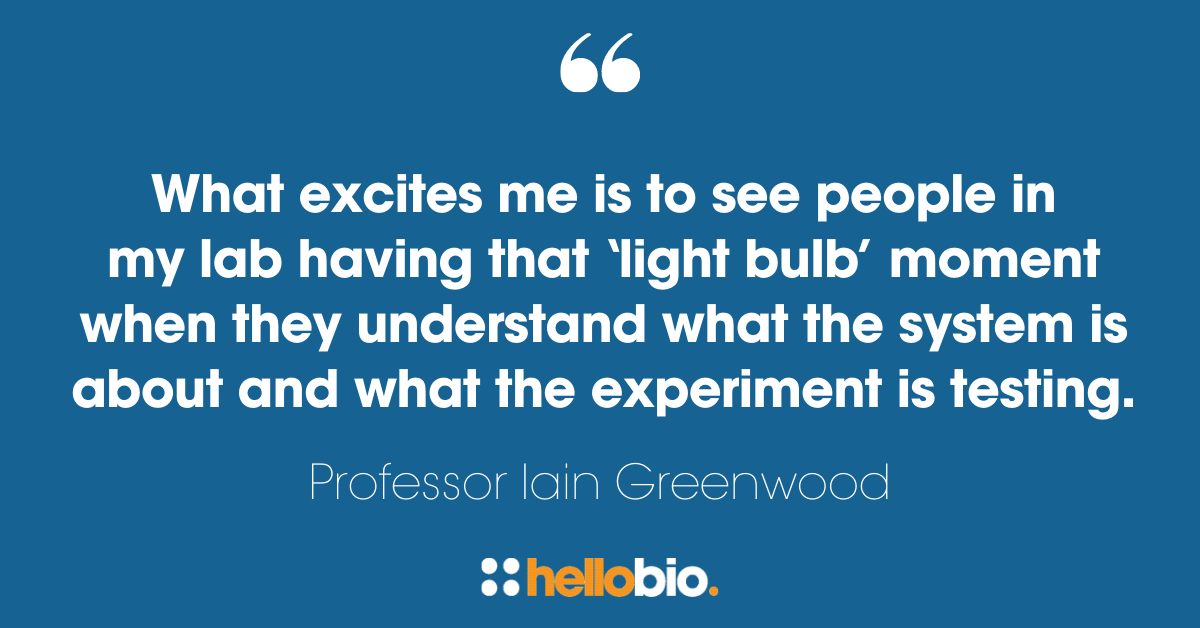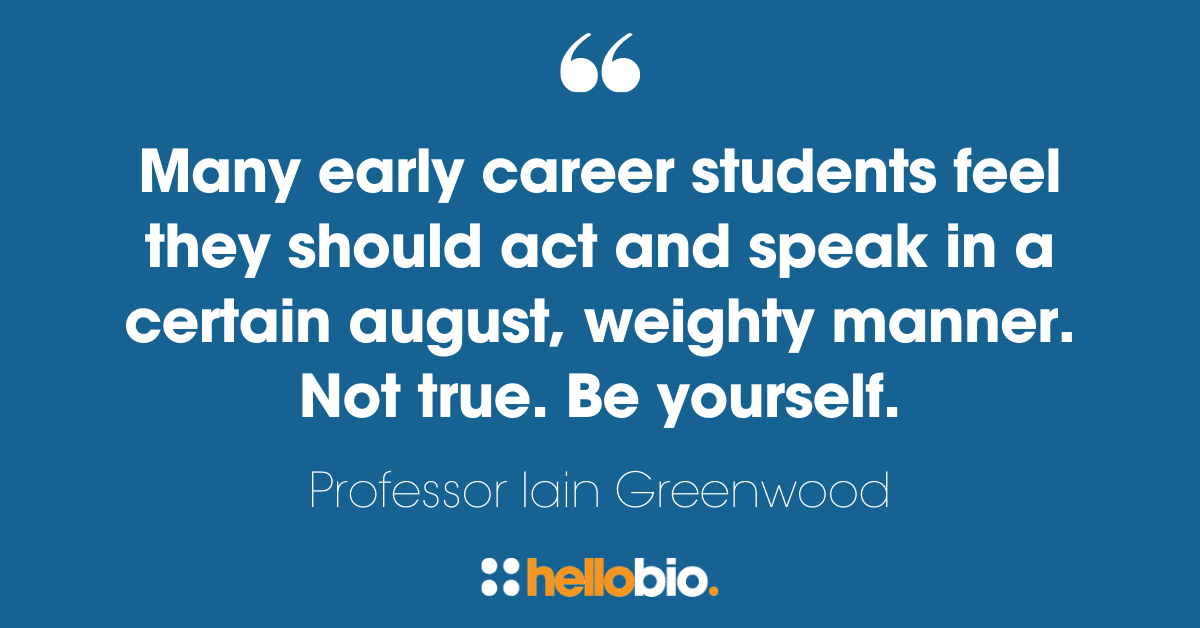Interviews with Scientists: Professor Iain Greenwood
Iain Greenwood became Professor of Vascular Pharmacology at St George’s, University of London in 2013 after joining as a postdoctoral researcher in 1993.
His scientific career began with a First class Honours Degree in Physiology and Pharmacology at the University of Hertfordshire in 1990, before studying for a PhD at the University of Manchester in the Smooth Muscle Research Group. He was editor for the British Journal of Pharmacology from 2006 to 2013 and was awarded the Zaimis Prize for long term commitment to the teaching of Pharmacology in December 2017.
We caught up with Iain to chat about his career, his current research, his proudest achievements, and more...
Thanks for speaking with us, Iain! Firstly, please tell us a bit about your background as a scientist...
My career began when I didn’t get the A-levels I needed to do Environmental biology at UEA, so I went to clearing and got accepted by Hatfield Polytechnic (now the University of Hertfordshire) to do BSc Applied Biology. In the first year we all did agriculture, ecology, microbiology, biochemistry and physiology/pharmacology. After that you had to select your preferred modules, and after year two I did a full year at the Merck Sharp & Dohme Neuroscience Research Labs in Harlow, Essex. On my return I got a 1st class degree and was top of my class. I did a PhD at Manchester University in Smooth Muscle Pharmacology, then came to St George’s as a postdoctoral researcher before getting a Wellcome Trust Fellowship. I went to Montreal for 4 months and then to the USA in 2001. I returned to St George’s to set up a research group – et voila! I have stumbled through a career but tried to maximise opportunities when they presented themselves to me.
What is the main focus of your current research?
I have a broad interest in smooth muscle function and regulation by ion channels and receptors. My biggest impact is to lead the field that has established KCNQ-encoded potassium channels, previously identified in heart and brain, as determinants of smooth muscle contractility. However, I have interests in other ion channels, receptor mechanisms and regulator signals.
What was your PhD research focused on?
Investigating the mechanism by which the ATP-sensitive potassium channel activator levcromakalim relaxed arterial smooth muscle.
What made you specialise in vascular pharmacology?
The easy answer is that Cardiovascular disease is a big killer and I wanted to help to correct this. But to be honest, I am a broad-spectrum researcher who has not really specialised as I have published on arteries, veins, bladder, uterus, colon. However, my first grant was from the British Heart Foundation and I have had decent success from this funder since 2002.
What is it about your field of work that excites you most?
Many people early in their careers feel a PhD or research career is about answering big questions. It is weighty, cerebral and august. But I am powered by an interest in working out how things fit together physiologically and how it may go wrong pathophysiologically. I apply this to any smooth muscle. What excites me is to see people in my lab having that ‘light bulb’ moment when they understand what the system is about and what the experiment is testing. It is also great when the many experiments and techniques come together into a story like the pieces of a jigsaw falling into place. It is not the big thoughts but the juggling of many little ones that is fun.
What achievement are you most proud of in your career so far?
I have had over 100 research papers published, spoken all over the world and have been involved with many impressive people in the field. All give me satisfaction but what actually gives me pride is to see someone who was in my lab moving onto the next stage of their research career. To enable good people to do good things is a great feeling.
What’s the most important lesson you have learned in your career so far?
No one survives in a vacuum, so interact with people – network, chat, interact.
What advice would you give to a young life scientist just starting out in their career?
Don’t struggle alone, ask for help and talk to people. In addition, many early career students feel they should act and speak in a certain august, weighty manner. Not true. Be yourself.
How has the COVID-19 pandemic affected your research?
At the moment my group is just one PhD student. He is amazing and has continued doing his research and supervised undergraduates throughout the pandemic - a research octopus. What has been lost are the ad hoc conversations that used to fill my days, chatting to students and researchers about wide-ranging topics that often lead to new research insights.
What does a typical working day look like for you?
Taking my daughter to school and walking the dog. Firing up the laptop and working on many different administrative tasks related to the Clinical Pharmacology degree, Biomedical Sciences degree, grant and paper writing, grant and paper reviewing, etc. If I go into SGUL, there is often a lot more talking, discussion of data or the experimental road ahead. There is no set routine and no set week. It is fluid.
Outside of your career, what do you enjoy doing most?
I don’t have passion projects but I am always listening to music of different genres. I have always played sport – cricket, football and rugby. My body is failing me but I still play 6-a-side football. I also like a giggle - life is too short not to laugh. That’s probably why I have created two charity comedy nights.
Did you always want to be a scientist when you were younger?
Nope. I had no idea what I wanted to do as a teenager and only decided upon a degree in Environmental biology because Greenpeace were in the news a lot in the early 1980s. Luckily, I did a broad biology degree and it turns out I was quite able at Physiology and Pharmacology.
If you weren’t a scientist, what do you think you would be doing instead?
I have never had a ‘grand plan’ and therefore no ‘Plan B’. Many people said they are surprised that I am a scientist. I would like to run an independent coffee shop with a customer’s music department.
What is the future direction for your work?
Cellular activity is dictated not by single proteins but protein-protein clusters or complexes. It will be interesting to decipher how protein complexes are constructed, arranged and modified in disease.
Who has influenced you most as a researcher?
I spent all of 2001 working at the University of Nevada in Reno, USA. My PI (Principal Investigator) was one of the first to bring molecular biology to physiology and was hugely respected. But he also loved a beer, to chat, to play golf and spending time with his family. I learnt from him and the Head of Department in Reno that you do not have to be a monster to be successful. Everyone’s contribution is valid. I like to think I still abide by that.
And finally, what's your favorite science quote and joke?
“If I have seen further it is by standing on the shoulders of Giants” – Isaac Newton. Often taken to mean researchers build upon the work of people that has gone before but I like to think the shoulders can be any advance – individual, technological, insight.
And not a joke per se but a great bit of wordplay in an editorial by Gary Yellen in 1997 about ion channel function: “Single channel seeks permeant ion for brief but intimate relationship.”
_________________________________________________
Thank you so much for a fantastic interview, Iain! We wish you all the best with your future research.
Connect with Professor Greenwood:
- Twitter: @IAGreeno
- LinkedIn: Iain Greenwood
_________________________________________________
If you enjoyed this article, why not check out the other resources available on our blog. We are passionate about supporting life scientists, early career life scientists and PhD students - with really low- priced reagents and biochemicals, early career scientist grants, and resources to help with both personal and professional development. We know how tough it is - so we hope you find these helpful!
Advice & guidance for life scientists
Click below to view our essential guides and articles to support life scientists, PhD students & early career life scientists:
Wellbeing for scientists
Click below for our resources to help improve your wellbeing:
Technical resources
Try our Molarity Calculator: a quick and easy way to calculate the mass, volume or concentration required for making a solution.
Try our Dilution Calculator: an easy way to work out how to dilute stock solutions of known concentrations
And - when you get to the stage of planning your experiments, don't forget that we offer a range of agonists, antagonists, inhibitors, activators, antibodies and fluorescent tools at up to half the price of other suppliers - click below to see how we compare with other suppliers:




















